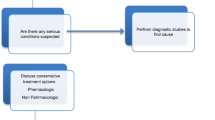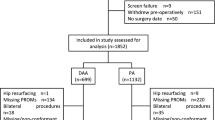Abstract
Background
Few have studied the correlation between patients’ and spine surgeons’ perception on outcomes, or compared these with patient-reported outcome scores. Outcomes studies are increasingly important in evaluating costs and benefits to patients and surgeons, and in developing metrics for payer evaluation and health care policy-making.
Objective
To compare patients’ and surgeons’ assessment of spine treatment outcome in a prospective blinded patient-driven spine surgery outcomes registry, and to correlate perceived outcomes ratings to validated outcomes scores.
Methods
Patients filled out surveys at baseline, 3 months and 6 months postoperatively, including Visual Analog Scale (VAS), and Neck Disability Index (NDI) or Oswestry Disability Index (ODI). Outcome was rated independently by patients and surgeons on a 7-point Likert-type scale.
Results
Two-hundred and sixty-five consecutive adult patients were surgical candidates. Of these, 154 (58.1 %) opted for surgery, with 69 (44.8 %) cervical and 85 (55.2 %) lumbar patients. One hundred and thirty-five (87.7 %) had both patient and surgeon postoperative ratings. Surgeons’ and patients’ ratings correlated strongly (Spearman rho = 0.53, p < 0.0001, 45.9 % identical, 88.2 % +/− 1 grade). The surgeon rated outcomes were better than patients in 29.8 % and worse in 21.15 %. Patient rating correlated better with the most recent NDI/ODI and pain scores than with incremental change from baseline. In multivariate analysis, age, location (cervical vs lumbar), pain ratings, and functional scores (NDI, ODI) did not have significant impact on the discrepancy between patient and surgeon ratings.
Conclusions
Patients’ and surgeons’ global outcome ratings for spinal disease correlate highly. Patients’ ratings correlate better with most recent functional scores, rather than incremental change from baseline.


Similar content being viewed by others
References
Atlas SJ, Deyo RA, Keller RB, Chapin AM, Patrick DL, Long JM, Singer DE (1996) The Maine Lumbar Spine Study, Part III. 1-year outcomes of surgical and nonsurgical management of lumbar spinal stenosis. Spine (Phila Pa 1976) 21:1787–1794, discussion 1794–1785
Atlas SJ, Keller RB, Wu YA, Deyo RA, Singer DE (2005) Long-term outcomes of surgical and nonsurgical management of lumbar spinal stenosis: 8 to 10 year results from the maine lumbar spine study. Spine (Phila Pa 1976) 30:936–943
Bertalanffy H, Eggert HR (1988) Clinical long-term results of anterior discectomy without fusion for treatment of cervical radiculopathy and myelopathy. A follow-up of 164 cases. Acta Neurochir (Wien) 90:127–135
Brokelman RB, van Loon CJ, Rijnberg WJ (2003) Patient versus surgeon satisfaction after total hip arthroplasty. J Bone Joint Surg Br 85:495–498
Brox JI, Sorensen R, Friis A, Nygaard O, Indahl A, Keller A, Ingebrigtsen T, Eriksen HR, Holm I, Koller AK, Riise R, Reikeras O (2003) Randomized clinical trial of lumbar instrumented fusion and cognitive intervention and exercises in patients with chronic low back pain and disc degeneration. Spine (Phila Pa 1976) 28:1913–1921
Carreon LY, Glassman SD, Campbell MJ, Anderson PA (2010) Neck Disability Index, short form-36 physical component summary, and pain scales for neck and arm pain: the minimum clinically important difference and substantial clinical benefit after cervical spine fusion. Spine J 10:469–474
Chapman JR, Norvell DC, Hermsmeyer JT, Bransford RJ, DeVine J, McGirt MJ, Lee MJ (2011) Evaluating common outcomes for measuring treatment success for chronic low back pain. Spine (Phila Pa 1976) 36:S54–S68
Copay AG, Glassman SD, Subach BR, Berven S, Schuler TC, Carreon LY (2008) Minimum clinically important difference in lumbar spine surgery patients: a choice of methods using the Oswestry Disability Index, Medical Outcomes Study questionnaire Short Form 36, and pain scales. Spine J 8:968–974
Deyo RA, Battie M, Beurskens AJ, Bombardier C, Croft P, Koes B, Malmivaara A, Roland M, Von Korff M, Waddell G (1998) Outcome measures for low back pain research. A proposal for standardized use. Spine (Phila Pa 1976) 23:2003–2013
Epstein NE, Hood DC (1997) A comparison of surgeon’s assessment to patient’s self analysis (short form 36) after far lateral lumbar disc surgery. An outcome study. Spine (Phila Pa 1976) 22:2422–2428
Eriksen EF, Buhl M, Fode K, Klaerke A, Kroyer L, Lindeberg H, Madsen CB, Strange P, Wohlert L, Espersen JO (1984) Treatment of cervical disc disease using Cloward’s technique. The prognostic value of clinical preoperative data in 1,106 patients. Acta Neurochir (Wien) 70:181–197
Fairbank JC, Couper J, Davies JB, O’Brien JP (1980) The Oswestry low back pain disability questionnaire. Physiotherapy 66:271–273
Fairbank JC, Pynsent PB (2000) The Oswestry disability index. Spine (Phila Pa 1976) 25:2940–2952, discussion 2952
Glassman SD, Carreon LY, Dimar JR, Campbell MJ, Puno RM, Johnson JR (2007) Clinical outcomes in older patients after posterolateral lumbar fusion. Spine J 7:547–551
Goebel S, Nabavi A, Schubert S, Mehdorn HM (2010) Patient perception of combined awake brain tumor surgery and intraoperative 1.5-T magnetic resonance imaging: the Kiel experience. Neurosurgery 67:594–600, discussion 600
Grob D, Mannion AF (2009) The patient’s perspective on complications after spine surgery. Eur Spine J 18(Suppl 3):380–385
Hagg O, Fritzell P, Nordwall A (2003) The clinical importance of changes in outcome scores after treatment for chronic low back pain. Eur Spine J 12:12–20
Hamburger C, Festenberg FV, Uhl E (2001) Ventral discectomy with pmma interbody fusion for cervical disc disease: long-term results in 249 patients. Spine (Phila Pa 1976) 26:249–255
Haro H, Maekawa S, Hamada Y (2008) Prospective analysis of clinical evaluation and self-assessment by patients after decompression surgery for degenerative lumbar canal stenosis. Spine J 8:380–384
Howe J, Frymoyer JW (1985) The effects of questionnaire design on the determination of end results in lumbar spinal surgery. Spine (Phila Pa 1976) 10:804–805
Lattig F, Grob D, Kleinstueck FS, Porchet F, Jeszenszky D, Bartanusz V, O’Riordan D, Mannion AF (2009) Ratings of global outcome at the first post-operative assessment after spinal surgery: how often do the surgeon and patient agree? Eur Spine J 18(Suppl 3):386–394
Lozano-Alvarez C, Perez-Prieto D, Salo G, Molina A, Llado A, Ramirez M (2012) Usefulness of the core outcome measures index in daily clinical practice for assessing patients with degenerative lumbar disease. Adv Orthop 2012:474685
Mannion AF, Porchet F, Kleinstuck FS, Lattig F, Jeszenszky D, Bartanusz V, Dvorak J, Grob D (2009) The quality of spine surgery from the patient’s perspective: part 2. Minimal clinically important difference for improvement and deterioration as measured with the Core Outcome Measures Index. Eur Spine J 18(Suppl 3):374–379
McGee MA, Howie DW, Ryan P, Moss JR, Holubowycz OT (2002) Comparison of patient and doctor responses to a total hip arthroplasty clinical evaluation questionnaire. J Bone Joint Surg Am 84-A:1745–1752
McGrory BJ, Morrey BF, Rand JA, Ilstrup DM (1996) Correlation of patient questionnaire responses and physician history in grading clinical outcome following hip and knee arthroplasty. A prospective study of 201 joint arthroplasties. J Arthroplasty 11:47–57
Porchet F, Lattig F, Grob D, Kleinstueck FS, Jeszenszky D, Paus C, O’Riordan D, Mannion AF (2010) Comparison of patient and surgeon ratings of outcome 12 months after spine surgery: presented at the 2009 Joint Spine Section Meeting. J Neurosurg Spine 12:447–455
Ragab AA (2003) Validity of self-assessment outcome questionnaires: patient-physician discrepancy in outcome interpretation. Biomed Sci Instrum 39:579–584
Ronnberg K, Lind B, Zoega B, Halldin K, Gellerstedt M, Brisby H (2007) Patients’ satisfaction with provided care/information and expectations on clinical outcome after lumbar disc herniation surgery. Spine (Phila Pa 1976) 32:256–261
Sasso RC, Smucker JD, Hacker RJ, Heller JG (2007) Artificial disc versus fusion: a prospective, randomized study with 2-year follow-up on 99 patients. Spine (Phila Pa 1976) 32:2933–2940, discussion 2941–2932
Smith AM, Barnes SA, Sperling JW, Farrell CM, Cummings JD, Cofield RH (2006) Patient and physician-assessed shoulder function after arthroplasty. J Bone Joint Surg Am 88:508–513
Taylor VM, Deyo RA, Ciol M, Farrar EL, Lawrence MS, Shonnard NH, Leek KM, McNeney B, Goldberg HI (2000) Patient-oriented outcomes from low back surgery: a community-based study. Spine (Phila Pa 1976) 25:2445–2452
Vernon H, Mior S (1991) The Neck Disability Index: a study of reliability and validity. J Manipulative Physiol Ther 14:409–415
Conflicts of interest
None.
Author information
Authors and Affiliations
Corresponding author
Rights and permissions
About this article
Cite this article
Roitberg, B.Z., Thaci, B., Auffinger, B. et al. Comparison between patient and surgeon perception of degenerative spine disease outcomes—a prospective blinded database study. Acta Neurochir 155, 757–764 (2013). https://doi.org/10.1007/s00701-013-1664-6
Received:
Accepted:
Published:
Issue Date:
DOI: https://doi.org/10.1007/s00701-013-1664-6




